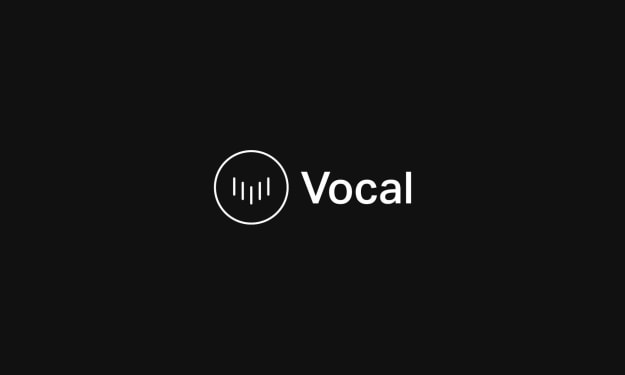
A short time ago, I had 'writer’s block.'
The thing is... I didn't realize it. Not at first.
To be honest, I actually thought the opposite: I believed I was on fire!
Truthfully - I genuinely thought I was on a roll that would never end. The reality was that I was stuck in one place, grinding my wheels. I just never saw it.
I'd been writing regularly for a few months. Some of it was good; some of it less so. But, I was being disciplined, and producing work on a regular basis.
And it was being read. The number of 'reads' I was getting on Vocal had far surpassed my expectations - instead of simply getting the anticipated single figures, thousands of people were reading my work.
And people were liking it. They were saying truly nice things about it.
So, I kept on writing. And writing.
I was in 'the zone.' So much so, that I started to work on three - sometimes four, or even five - pieces simultaneously.
And then...
From nowhere, nothing.
The words dried up.
Despite there being no shortage of ideas floating around my head, I suddenly couldn’t find the inclination to continue expanding any of them.
I thought they were all rubbish. Unoriginal.
I thought I was rubbish. Unoriginal.
For someone with depression, this is a familiar feeling: I spend most of my life thinking I’m rubbish.
But writing has always been the exception - it’s the one thing I don’t think I entirely suck at.
So, being unable to write, being unable to even craft a simple sentence, was especially painful.
But more so now.
Because my writing mattered to me more than it ever had.
After my discharge from a psychiatric ward in October 2019, writing had become one of the central pillars of my recovery. The articles I wrote helped me to explore the mistakes I'd made in my past, to consider how I could manage my mental health more effectively in the future. In short, it had helped me immeasurably. Without my writing, relapse would’ve happened a lot more than it did.
But this was even more pronounced after Covid-19 sent us all into ‘lock-down’: My writing enabled me to do something productive with my time, and keep my mind active.
But, suddenly….
Nothing.
I spent hours, days, trying to string words together - but everything was suddenly stilted, lifeless.
How had this happened? A fortnight before, I couldn't stop writing. Now, I couldn't even start.
I have to be honest: Having never had 'writer's block', I thought it was a myth. I'd never really believed it. I thought anyone who claimed to be suffering from it was just being lazy. Turns out they really weren't.
However, because I'd never experienced 'writer’s block' before, not only was this insight a bit of a shock to my system, I also realized I was utterly unprepared for it. My ‘bag of tricks’ to combat it was fairly much empty.
I took walks (well, a walk - as we're in ‘lock-down’, we're only allowed out once a day for exercise). I re-watched favorite films. I re-read beloved authors. I tried to distract my mind from the words I couldn’t write, and busied myself tidying my apartment. And…
Still nothing.
If anything, the work I produced was getting worse.
And it was then that a truly horrible thought occurred to me:
Did this mean I didn’t possess the requisite mentality to be a writer? After all, according to all those books I’d devoured about creative writing, you can’t simply wait for the muse for strike - she’s a fickle mistress, and you’ve got to find a way to churn out pieces regardless of how inspired you feel. And I felt no inspiration - did this mean I wasn’t up to the job? Should I simply give up now?
The answer to that question was (eventually), ‘No.’
I’d like to say it was a resounding, ‘No’, but I’d be lying. To be honest, I did come close to giving up.
However, I’ve always been a quitter. I’ve always given up. But, if there was one lesson my admission taught me above any other, it’s that I had to learn how to keep going. Running away from difficulty was one of the reasons I had ended up hospitalized. If I’d faced more of my problems, instead of running away, I would not have needed the help I did.
After a few days of wallowing in self-pity, I knew that I wasn’t going to quit. I honestly don’t know if I can ever make enough money from my writing for it to become a career. But, to be frank, it’s too early to even begin considering such things. At the moment, my recovery is everything; that’s my primary focus.
However, I do know that I love writing, and want to keep it as part of my life. My writing had (overall) aided my recovery; it had become vital to my mental health. And, apart from this period of joyless inertia, I also (overall) loved doing it. And surely there's not better reason for doing something than for the sheer fun of it.
The writing was staying. I wasn't going to quit.
But, if I kept writing, I knew I would also endure other times like this; I'm not naive. I knew that - at some point - I'd be 'blocked' again.
So, I not only needed strategies that would help me in the future, I also needed to try and see what lay at the heart of my current stasis: In order to cure the problem, I had to at least try and find the cause. I didn’t just want to blast my way through - I also wanted to try and discover why I couldn’t write.
But how?
I did what I normally do when facing a problem I didn’t know the answer to: I turned to the Internet.
And, almost immediately, I found a quote from Charles Bukowski:
“Writing about writer’s block is better than not writing at all.”
Could that work? Could writing about 'writer’s block' actually cure my own 'writer’s block'? Might that process throw some light as to why I felt so 'stuck' now?
I was skeptical. But, to be honest, such was my pessimism about anything writing-related at that moment, I’d would have probably been skeptical about any single piece of advice, even if it made perfect sense.
However, I had nothing to lose, and I had to try something. I couldn’t keep on re-writing the same sentences over and over - it was time to try something new.
I would write about 'writer’s block.'
I would write my way through my 'block.'
And, hopefully, I'd learn a bit more why I was suffering from it now.
Having read a fair about about 'writer's block', I decided to set myself a routine: I would write from 7 am to 8 am, just before I started teaching English online.
Also, as per the advice I'd read, it would be free association - apparently that was good for stirring your creative juices. I’d try and stick to exploring my ‘block’ - after all, that was always my primary aim. But, I was also happy to see where that led me.
Finally, also as advised, I wouldn't read back what I'd written the day before; I'd simply start writing each morning at 7.
The first day was torture. As was day two. And three. And four. And...
Words slowly started to come, but coherency was at a premium. It was all one big rambling mess. A jumble of ideas, with no overarching theme.
On the one hand, that was okay - this was free association after all. But, my aim, at the outset, had just been to try and write about my ‘block.’ But, even though I wasn’t reading my work back, I also knew that I was straying from that theme. Free association was one thing - where I was going was somewhere entirely different.
I wrote into day five. Then six. Then...
On day seven, I started writing... but stopped. At the time, I wasn't quite sure why I did. All I did know was 'something' had shifted in me. And that I felt the urge to read back the work of the past week. I knew I wasn't supposed to, but I just felt a need to do so.
So I did.
And it become obvious. The reason why I was blocked was there in the largely incomprehensible, literary soup I'd been making all week: There were too many ingredients.
You know I said I had no shortage of ideas? Well, that was the problem - I had too many.
One of the beauties of committing yourself to write regularly is that you won’t struggle for ideas. One idea plants the seeds of another, and another, and another…
But, there's also an added bonus (or difficulty, if you want to be negative).
All of those 'ideas' could themselves be broken down into an army of smaller ones that could each also form the basis of an article, or story, or poem, or play or....
As an example, take the most common topic ever discussed; love.
Where do you start? Falling in love? What makes a relationship work? Heartbreak?
In fact, I could probably spend the rest of my life just exploring ‘love’, and still have mountains left to say by the time I reach my deathbed.
But, when you’ve got your writer’s ‘head’ on, you also see ideas everywhere. Not just in the writing you're doing, but... well, just everywhere.
At times like this, it’s easy to see the ‘big’ ideas:
At the height of the Cornoavirus crisis, over 1,000 people were dying every day in the UK alone.
1,000.
If that doesn’t generate any strong emotion in you, if the sheer horror of trying to comprehend how nearly 1,000 families woke up every day, and had to suddenly try and grieve the loss of a loved one that - due to social distancing restrictions - they couldn’t even mourn through the ritual of a funeral, if that doesn’t stir something in you, then - quite frankly - I couldn’t care less what you’ve got to say about the world. If that doesn’t stir your compassion, then you don’t really interest me as a person, let alone as a writer.
But, hidden among the ghastly ‘big picture’, there’s also the millions of tiny ‘ideas.’
There’s the genesis of an idea in that bitter-sweet comment a friend has made on Facebook about trying to home-school their children … There’s another one on Twitter in the efforts of a comedian friend trying to promote their self-funded sit-com - without any gigs, they’ve got to find some way to supplement their income… There’s another in that item on the TV news about the fifteen year-old boy who’s making PPE for NHS staff using his 3-d printer in the comfort of his bedroom…
Where do you start?
Which one do you choose?
The answer to that question, as I discovered, is that you start wherever you want.
The trick is to just choose one.
That's it. Just pick one.
A huge part of writing is subconscious - that's the creative bit. But, an equally sizable portion is conscious.
It's about deliberate choice.
It's about looking at your work, objectively, and analyzing whether the grand structure is fit for purpose. It's considering whether a character would really that say that wonderfully witty line of dialogue, or whether your writer's ego is just too impressed with it's own cleverness to do what's best, and cut it.
And it’s in choosing an idea, one idea, and then sticking with it until the bitter end. Or, at the very least, to the end of that first draft.
I hadn't.
I had become engrossed in the generation of ideas, instead of selecting which one I was going to work on next.
Simply put, I overwhelmed myself with all my choices, and confused myself into inertia.
The solution was simple: I picked one. Just one. I didn't forget about all the others; I just made a commitment to myself that I was going to see that particular journey to its conclusion. No giving up. No trying to simultaneously explore 3 or 4 ideas. Just one.
As it turned out, this article is the result.
I also played a very simple trick on myself: I've separated 'ideas' from the actual pieces themselves.
Previously, everything got typed up. Not now. 'Ideas' are written by hand, in my nice, new notebook. Once I've made my decision about which one comes next, that's when I hit the laptop. 'Ideas' are written down: 'Articles' are typed up. It's childlike in it's simplicity, but it works; try it.
I’m not ‘blocked’ anymore. I did manage to blast my way through. And the process of doing so taught me a lot about what to do when - inevitably - I'm 'blocked' again.
As a result, my bout of 'writer's block' turned out to be one of the most enlightening creative experiences I've had.
And it's given me no shortage of ideas...
----------------------------------------------------------------------------------------
If you've liked what you've read, please check out my other stories and articles on Vocal.
If you've really liked what you've read, please share with your friends on social media.
If you've really, really liked what you've read, a small tip would be greatly appreciated.
Thank you!
About the Creator
Christopher Donovan
Hi!
Film, theatre, mental health, sport, politics, music, travel, and the occasional short story... it's a varied mix!
Tips greatly appreciated!!
Thank you!!






Comments
There are no comments for this story
Be the first to respond and start the conversation.